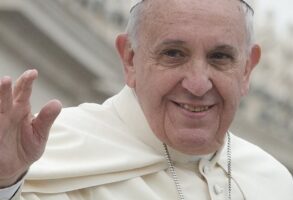Published June 24, 2015
I’m not Catholic, I’m Jewish, so you should certainly take my reading of papal documents with a healthy dose of kosher salt. But for what it’s worth, the kerfuffle over Pope Francis’s recent encyclical on (among other things) the environment seems to me to point to some interesting tensions at the heart of modern environmentalism.
A lot of critical interpretations of the encyclical have treated it as abusing the Pope’s standing and authority (in the eyes of Catholics and others) to advance a left-wing or radical environmentalist political agenda by dressing it up as Catholic doctrine. Having finally read the encyclical, I’m left thinking roughly the opposite is the case. The Pope is trying to hijack the standing and authority (in the eyes of global elites and others) of a left-wing or radical environmentalist agenda to advance a deeply traditional Catholic vision of the human good and to get it a hearing by dressing it up as enlightened ecology.
The result involves a lot of incoherence, to be sure. The meaning of “nature,” which is obviously of particular importance to this text, is taken up in a variety of profoundly contradictory ways—most notably the Hebrew idea of a created order that can only be understood in relation to its creator, the Greek idea of a rational order in which the meaning of each part and of the whole can be best understood by contemplation of its end or purpose, and the modern idea of a sum of knowable causes that can be not only understood but mastered (and so given purpose) by a knowledge of those causes.
The first of those two have long been in a creative tension, explored and made creative above all by Christianity itself, and the third arose out of a kind of impatience with the inability of the products of that tension to take the world in hand and make it do what we please. Francis certainly wants to reject the last of these, yet he still cannot help (quite rightly) admiring what it has achieved in the world and even what it can tell us about what harm we might be doing to the world. He employs all three ideas of nature, albeit the first two far more than the third, and in a rather fetching way he rubs our noses in the fact that he will make no effort to resolve the tensions.
Instead, he seems to want to capitalize on another tension, resulting from the differences between how the modern Left tends to think about nature and how modern science tends to think about it. The scientific outlook has always sought something like (in Francis Bacon’s characteristically terse formulation) “the conquest of nature for the relief of man’s estate.” Rene Descartes put the point even more bluntly: the goal of the scientific enterprise he envisioned was to make human beings “masters and possessors of nature.” Conquest, mastery, and possession—the expansion of human power—has been the goal of modern science, and it has been a goal well achieved, and to our very great benefit. This has been the goal because, in this view, nature deserves such harsh treatment for how it treats us: It is a merciless oppressor and killer of innocents and needs to be tamed.
But for the modern Left, which wants to think of itself as the party of science, this goal is actually quite problematic. Over the past century or so, the Left in the developed world has come to take a rather complicated view of power. It has become highly suspicious of certain kinds of power in particular: the power of nations, of corporations, of the rich over the poor, and also of man over nature (or as it has been renamed, to make it passive and therefore a more believable victim, “the environment”). This suspicion has somehow tended not to extend to the power of the state in domestic affairs or, generally speaking, to the power of science (which is, after all, a power over nature). But important as these blind spots are, it still seems fair to say that the modern left, at least when it is at its best, frequently concerns itself with abuses of power.
In our time, the tension between this postmodern sensitivity about power and the modern scientific view of nature is most prominently on display in the environmental movement. Near the core of the ethic underlying modern environmentalism is a holistic approach to nature, which could hardly be more different than the scientific approach. And perhaps even closer to the core is a sense that human activity might disrupt a larger order in which we play a part—but not the commanding part. This, it seems to me, is part of the reason why environmentalism has been an outlet for moralism on the Left. As Charles Rubin put it in his insightful 1994 book The Green Crusade, “environmentalism is the temperance movement of our time,” albeit largely devoid of the explicit religious convictions that moved those prior progressives. Think “addicted to oil.” It is a movement stirred by moralism to reform a prominent human excess, and driven by the hope that this reform will improve almost everything about life. As Al Gore put itwhen he was given a Nobel Peace Prize for his environmentalist efforts, “the climate crisis is not a political issue; it is a moral and spiritual challenge to all of humanity. It is also our greatest opportunity to lift global consciousness to a higher level.”
It seems to me that Francis sees something of an opening in this peculiar (and often nonsensical) attitude—that he sees in it an admission of uncertainty by elite and mostly secular liberals around the developed world about the larger worldview of the Left, and wants to show them where their doubts might lead in areas well beyond ecology.
This document isn’t simply such an effort at persuasion of course. It does seem as though Francis is himself persuaded of some of the fears expressed by the radical fringes of modern environmentalism, and that he is also giving vent to a deeply felt (and at times frankly crude) reactionism, anti-modernism, and anti-capitalism. We should try to learn even from those where we can—especially from his critiques of capitalism, which we devoted friends of capitalism much too easily dismiss.
But I don’t think the fundamental purpose of the encyclical is to tell Catholics they should care about environmentalism, even if the Pope would surely like them to do so. I think its purpose is to tell environmentalists they should care about their souls.
— Yuval Levin is the Hertog Fellow at the Ethics and Public Policy Center.








